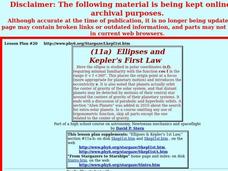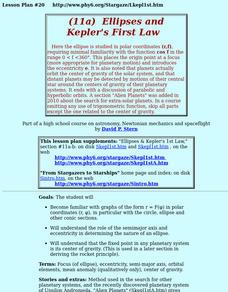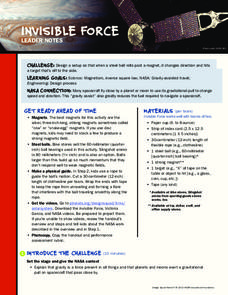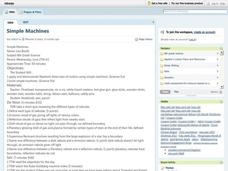Voyage Solar System
Round and Round We Go — Exploring Orbits in the Solar System
Math and science come together in this cross-curricular astronomy lesson plan on planetary motion. Starting off with a hands-on activity that engages the class in exploring the geometry of circles and ellipses, this lesson...
Curated OER
Planet Paths: Studying Planetary Orbital Paths
Young scholars define and identify planetary orbit, ellipse, parabola, and hyperbola, and simulate Kepler's Second Law. They explore interactive websites demonstrating orbital motion and complete modeling activities.
California Academy of Science
Kinesthetic Astronomy: Mars Opposition Dance
Your class will watch as one child orbits the sun as Earth, while another orbits as Mars. If the timing is right, they will see the repetitive dance between the two planets and discover how often they are opposite from each other. For...
PBS
Analyzing Light Curves of Transiting Exoplanets
Scientists detected exoplanets by measuring how the brightness of stars changed over time. Young astronomers interpret and analyze the same data that led to exoplanet discoveries. They learn to apply light curve graphs and connect the...
Curated OER
How Does a Satellite Stay in Orbit?
Students explore placing a satellite into orbit, then about forces needed to keep an object in orbit. They examine how satellites orbit in elliptical paths and about properties of ellipses. They learn Kepler's 3rd Law of Planetary Motion
Curated OER
Universal Gravitation and Kepler's Laws
Learners develop problem-solving strategies dealing with Kepler's laws of planetary motion. they examine the law of universal gravitation and continue with problem-solving strategies. Students complete a take-home quiz.
Curated OER
Our Solar System
Students analyze the theories of the formation of the universe and solar system. Students analyze planetary motion and the physical laws that explain that motion: Rotation, Revolution, Apparent diurnal motions of the stars, sun, and...
Curated OER
Was Kepler Correct?
Students are introduced to Kepler's 2nd law of Planetary Motion. The lesson reinforces the understanding of focal points. They calculate the sector area of an ellipse.Students expand understanding by modeling Kepler's 2nd Law of...
Curated OER
Motion Through the Ages
Eighth graders conduct internet research to produce a timeline of man's growth in understanding of concepts of motion and planetary motion through history.
Curated OER
Ellipses and Kepler's First Law
The class examines graphs in the form r = F(¿¿) in polar coordinates (r, ¿¿), in particular with the circle, ellipse and other conic sections. They determine the nature of an ellipse by studying the role of the semimajor axis and...
Curated OER
Meet the Neighbors: Planets Around Nearby Stars
Students explain why a transiting planet causes a periodic dimming in the light from its parent star. They determine the radius of a planet, and its orbital distance, by analyzing data and manipulating equations. Students compare the...
Curated OER
World In Motion Curriculum
Middle schoolers explore the night sky and its solar system. Using a Digitarium planetarium system, students observe four constellations. They discover the phases of the moon and eclipses. Middle schoolers recognize the difference...
Curated OER
Lesson Plan on Kepler's Laws of Planetary Motion
Students construct a solar system model. In this space science lesson plan, students calculate the eccentricity of a planet's orbit. They calculate the period of a planet's revolution using Kepler's formula.
Curated OER
Orbital Mechanics
Twelfth graders examine the misconceptions of Newton's laws of motion. In this motion and gravity lesson students interpret data and see the effects of gravity.
Curated OER
Charting Seasonal Changes
Students research the Earth's patterns of rotation and revolution, create a chart and graph of these patterns and use them to explain the causes of night and day and summer and winter.
Curated OER
Was Kepler Correct?
Students investigate the elliptical orbit around the Sun. They use the information gathered to measure the distance to the Sun from the closest orbital point and the farthest orbital point.
Curated OER
Solar System
Students analyze theories on how the solar system was formed. In this solar system lesson students explain the rotation and revolution of motion.
Journey Through the Universe
Our Solar System
Take your class on a journey through our solar system. Learners explore each planet, from Mercury to Pluto, and discuss various features that differentiate one from another. They complete activities related to the topics and discuss the...
Curated OER
Ellipses And Kepler's First Law
Students explain that planets actually orbit the center of gravity of the solar system, and that distant planets may be detected by motions of their central star around the centers of gravity of their planetary systems.
Curated OER
Planets Curriculum
Students complete an in-depth study of the known planets in the solar system. As a class, students identify the planets that are known in the universe, in the night sky. They explain the differences between planets and stars and the...
PBS
Invisible Force
Investigate invisible forces. Young engineers design a setup that changes the direction of a steel ball using a magnetic force. The purpose of the setup is to model the gravitational pull of spacecraft by planetary bodies.
Curated OER
Scientific Inquiry: Periodic Motion
Students construct their own pendulum. In this physics lesson, students design an experiment to find the factors affecting its period. They formulate a conclusion based on experimental data.
Curated OER
Exploring the Celestial Neighborhood
Ninth graders study the origin and organization of the solar system. They investigate the Earth's place in the system and how planetary motions explain natural phenomena observable from Earth.
Curated OER
Simple Machines
Learners engage in a lesson that is concerned with the concept of a simple machine and uses the law of motion to justify why they operate. Students explore the laws by constructing some simple machines to illustrate the concepts.

























